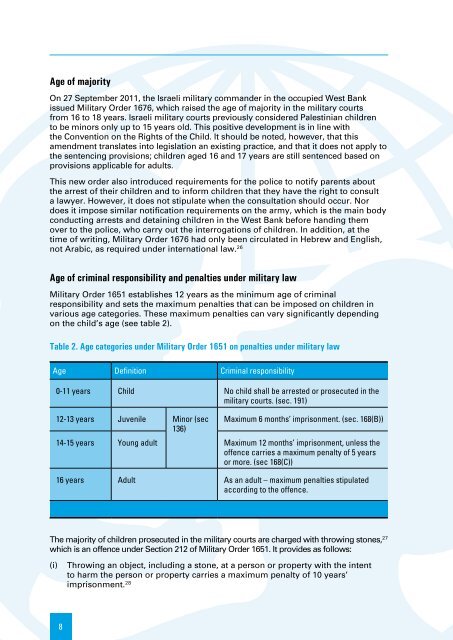Children in israeli Military detention
Children in israeli Military detention
Children in israeli Military detention
Create successful ePaper yourself
Turn your PDF publications into a flip-book with our unique Google optimized e-Paper software.
age of majority<br />
On 27 September 2011, the Israeli military commander <strong>in</strong> the occupied West Bank<br />
issued <strong>Military</strong> Order 1676, which raised the age of majority <strong>in</strong> the military courts<br />
from 16 to 18 years. Israeli military courts previously considered Palest<strong>in</strong>ian children<br />
to be m<strong>in</strong>ors only up to 15 years old. This positive development is <strong>in</strong> l<strong>in</strong>e with<br />
the Convention on the Rights of the Child. It should be noted, however, that this<br />
amendment translates <strong>in</strong>to legislation an exist<strong>in</strong>g practice, and that it does not apply to<br />
the sentenc<strong>in</strong>g provisions; children aged 16 and 17 years are still sentenced based on<br />
provisions applicable for adults.<br />
This new order also <strong>in</strong>troduced requirements for the police to notify parents about<br />
the arrest of their children and to <strong>in</strong>form children that they have the right to consult<br />
a lawyer. However, it does not stipulate when the consultation should occur. Nor<br />
does it impose similar notification requirements on the army, which is the ma<strong>in</strong> body<br />
conduct<strong>in</strong>g arrests and deta<strong>in</strong><strong>in</strong>g children <strong>in</strong> the West Bank before hand<strong>in</strong>g them<br />
over to the police, who carry out the <strong>in</strong>terrogations of children. In addition, at the<br />
time of writ<strong>in</strong>g, <strong>Military</strong> Order 1676 had only been circulated <strong>in</strong> Hebrew and English,<br />
not Arabic, as required under <strong>in</strong>ternational law. 26<br />
age of crim<strong>in</strong>al responsibility and penalties under military law<br />
<strong>Military</strong> Order 1651 establishes 12 years as the m<strong>in</strong>imum age of crim<strong>in</strong>al<br />
responsibility and sets the maximum penalties that can be imposed on children <strong>in</strong><br />
various age categories. These maximum penalties can vary significantly depend<strong>in</strong>g<br />
on the child’s age (see table 2).<br />
table 2. age categories under <strong>Military</strong> order 1651 on penalties under military law<br />
Age Def<strong>in</strong>ition Crim<strong>in</strong>al responsibility<br />
0-11 years Child No child shall be arrested or prosecuted <strong>in</strong> the<br />
military courts. (sec. 191)<br />
12-13 years Juvenile M<strong>in</strong>or (sec<br />
136)<br />
8<br />
Maximum 6 months’ imprisonment. (sec. 168(B))<br />
14-15 years Young adult Maximum 12 months’ imprisonment, unless the<br />
offence carries a maximum penalty of 5 years<br />
or more. (sec 168(C))<br />
16 years Adult As an adult – maximum penalties stipulated<br />
accord<strong>in</strong>g to the offence.<br />
The majority of children prosecuted <strong>in</strong> the military courts are charged with throw<strong>in</strong>g stones, 27<br />
which is an offence under Section 212 of <strong>Military</strong> Order 1651. It provides as follows:<br />
(i) Throw<strong>in</strong>g an object, <strong>in</strong>clud<strong>in</strong>g a stone, at a person or property with the <strong>in</strong>tent<br />
to harm the person or property carries a maximum penalty of 10 years’<br />
imprisonment. 28


